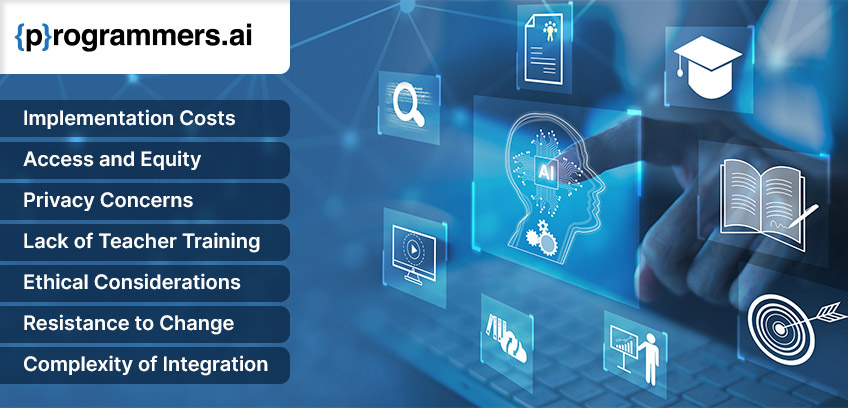AI in Education: Advantages, Challenges, & Use Cases 2024
The educational landscape is undergoing a significant transformation driven by a powerful force: Artificial Intelligence (AI). No longer confined to science fiction, AI is rapidly making its way into classrooms around the world, promising to revolutionize the way we learn and teach. From personalizing learning paths to fostering deeper engagement, AI in education holds immense potential to improve educational outcomes for all students.
This blog delves into the exciting world of AI-powered education. We’ll explore the numerous benefits AI offers, including its ability to tailor learning to individual needs, create interactive and engaging experiences, and bridge the gap for students with disabilities. However, we’ll also address the challenges that need to be considered, such as potential biases in algorithms and the importance of data privacy. Finally, we’ll showcase real-world use cases that demonstrate how AI is already transforming education, from intelligent tutoring systems to personalized learning platforms. So, buckle up and get ready to explore the exciting possibilities of AI in education!
The evolving impact of AI in education
Artificial intelligence (AI) is revolutionizing education, transforming how knowledge is delivered and understood. Traditionally, education was uniform, but AI enables personalized learning by analyzing student data to tailor curriculums and interventions. At Programmers, our AI development services facilitate this transformation by creating adaptive learning platforms and automated grading systems that enhance educational effectiveness. It fosters engagement through interactive, gamified experiences that cater to diverse learning styles, making learning more dynamic and motivating. AI also promotes inclusivity through tools like text-to-speech and translation, ensuring all students receive tailored support. Looking forward, AI’s potential in education is vast, promising advancements like real-time tutoring, virtual reality simulations developed by our expert programmers, and constant learning companions. However, challenges such as algorithm bias and privacy concerns must be carefully navigated to maximize AI’s benefits ethically.
10 Top Advantages of AI in Education
AI in education offers a plethora of benefits that can transform the learning experience for both students and teachers. Here are 10 key advantages to consider:
1. Personalized Learning
AI is good at tailoring learning paths to individual students. Through the analysis of data on strengths, weaknesses, and learning styles, AI can draw curriculums that are personalized for the learner, recommend relevant content, and adjust difficulty levels to ensure understanding. This feature of AI benefits education and gives students the freedom to develop at their own pace and master the concept before going to more complex material. The benefits of AI in education include creating a more inclusive and adaptive learning environment that meets the unique needs of each student.
2. More Engagement
Think of classrooms that are interactive, gamified, and adapted to diverse learning styles. AI in education can make such engaging learning experiences possible; they include simulations, virtual reality, and real-life applications. This makes the learning environment more engaging and motivating, thus keeping students excited about the process. As artificial intelligence is capable of providing quick feedback and giving adaptive challenges, it helps keep the learning experience dynamic for students. Interestingly, AI tools can also identify disengaged students and take appropriate measures to re-engage them.
3. Greater Accessibility and Equity
Artificial intelligence will likely close the gap for students with disabilities or language barriers. Text-to-speech tools, audio descriptions, and AI-based language translation help create a more inclusive learning environment. Students with learning challenges benefit from tailored support and alternative strategies that AI recommends. The latter will empower teachers to recognize better and respond to individual needs so that no student is left behind. This promotes a more equitable system of education in which every student is given the opportunity to succeed.
4. 24/7 Intelligent Support
AI-powered tutors and virtual learning companions can provide students with immediate assistance outside of class hours. This allows for on-demand explanation of concepts, personalized feedback, and additional practice opportunities, ensuring students never feel lost or discouraged. Moreover, these technologies can adapt to individual learning paces and styles, offering customized learning experiences that cater to each student’s specific needs. They also contribute to a more inclusive educational environment by breaking down geographical barriers and providing equitable access to resources for all learners, regardless of their location or background.
5. Automated Grading and Feedback
AI in education can automate tedious tasks like grading essays and multiple-choice questions, freeing up valuable teacher time. Additionally, AI-powered feedback systems can analyze student work, providing detailed insights into strengths, weaknesses, and areas for improvement. This allows teachers to focus on providing more personalized guidance. Furthermore, these systems can maintain consistency and fairness in grading, reducing subjective biases and ensuring that each student receives objective evaluations based on their performance. They also facilitate timely feedback, enabling students to learn from their mistakes promptly and make necessary adjustments to enhance their understanding and skills.
6. Data-Driven Insights
AI can analyze vast amounts of student data to identify trends and patterns in learning. This data can be used to pinpoint areas where the curriculum needs improvement, personalize instruction for different student groups, and track overall learning progress more effectively. Moreover, AI analytics can help educators predict student performance trends, enabling proactive interventions to support struggling students before they fall behind. By harnessing this data, schools can also refine their educational strategies continuously, adapting to the evolving needs and learning styles of their students, thereby fostering a more dynamic and responsive learning environment.
7. Teacher Empowerment
AI is not meant to replace teachers, but rather to empower them. By automating administrative tasks and providing real-time insights into student performance, AI allows teachers to focus on what they do best – guiding, motivating, and inspiring students. This collaborative approach between AI and teachers fosters a more student-centered learning environment, where educators can adapt their teaching strategies based on timely data and student feedback, ensuring that each student receives personalized support to reach their full potential.
8. Content Creation and Curation
AI in education can assist teachers in creating engaging and effective learning materials. It can help generate lesson plans, suggest relevant multimedia resources, and personalize content based on student needs. This saves teachers time and allows them to focus on crafting the overall learning experience. Furthermore, AI tools can analyze the effectiveness of different teaching materials and methodologies, providing educators with insights that enable continuous improvement in their instructional strategies.
9. Differentiated Instruction
AI can cater to diverse learning styles and abilities. By providing differentiated instruction, AI ensures that all students are challenged appropriately, regardless of their background or learning pace. This fosters a more inclusive learning environment where every student can thrive. Moreover, AI algorithms can adapt in real-time to individual student responses and progress, offering tailored interventions and support to address specific learning needs effectively.
10. Lifelong Learning Support
AI in education-powered learning platforms can be used beyond the traditional classroom setting. Students can access personalized learning materials, practice skills, and receive feedback even after they graduate. This empowers individuals to continue learning and growing throughout their lives. Furthermore, AI can recommend new areas of study or professional development based on a user’s existing skills and career goals, enabling continuous upskilling and adaptation to changing job market demands.
Challenges of AI in Education and Solutions
1. Implementation Costs
Challenge: Integrating AI technologies into educational institutions can be costly, requiring investments in infrastructure, training, and maintenance.
Solution: Collaborate with government bodies, private sectors, and philanthropic organizations to secure funding for AI implementation in education. Additionally, prioritize phased implementation, starting with pilot projects to demonstrate ROI and build confidence.
2. Access and Equity
Challenge: AI adoption may exacerbate existing disparities in access to quality education, especially in underserved communities.
Solution: Develop AI solutions with a focus on inclusivity and accessibility. Provide subsidies or grants to schools in underserved areas for acquiring AI technologies. Ensure that AI tools are user-friendly and available in multiple languages to cater to diverse student populations.
3. Privacy Concerns
Challenge: AI systems collect and analyze large amounts of sensitive student data, raising concerns about privacy and security.
Solution: Implement robust data protection measures, such as encryption and anonymization, to safeguard student information. Comply with data privacy regulations (e.g., GDPR, CCPA) and educate stakeholders on the ethical use of AI to build trust and transparency.
4. Lack of Teacher Training
Challenge: Many educators lack the necessary skills and training to effectively integrate AI tools into their teaching practices.
Solution: Offer professional development programs and workshops focused on AI literacy for educators. Provide hands-on training and support to empower teachers in using AI-powered tools to enhance teaching and learning experiences.
5. Ethical Considerations
Challenge: AI algorithms can inadvertently perpetuate biases or make ethically questionable decisions, impacting student outcomes.
Solution: Prioritize fairness and transparency in AI development. Conduct regular audits of AI systems to detect and mitigate biases. Involve diverse stakeholders in the design and evaluation of AI solutions to ensure inclusivity and ethical integrity.
6. Resistance to Change
Challenge: Some stakeholders, including educators, parents, and students, may resist the adoption of AI in education due to fear of job displacement or concerns about over-reliance on technology.
Solution: Foster a culture of innovation and collaboration by demonstrating the tangible benefits of AI in education. Engage stakeholders in dialogue, address misconceptions, and emphasize AI’s role as a complement to, rather than a replacement for, traditional teaching methods.
7. Complexity of Integration
Challenge: Integrating AI technologies into existing educational frameworks and curriculum can be complex and time-consuming.
Solution: Develop interoperable AI solutions that seamlessly integrate with existing educational systems, such as learning management systems (LMS) and student information systems (SIS). Provide technical support and consultation to educational institutions throughout the integration process.
Addressing these challenges requires a holistic approach that combines technological expertise, stakeholder engagement, and a commitment to ethical standards. By overcoming these hurdles, AI has the potential to revolutionize education, making it more personalized, inclusive, and effective for all learners.
Use Cases of Ai in Education
Artificial intelligence (AI) is increasingly being integrated into various aspects of education to enhance learning experiences, improve administrative efficiency, and personalize education. Here are some key use cases of AI in education:
- 1. Machine Learning (ML): This is the foundation of AI, allowing systems to learn from data without explicit programming. In education, ML algorithms analyze student data (performance, strengths, weaknesses, learning styles) to personalize learning paths, recommend resources, and adapt difficulty levels.
- 2. Natural Language Processing (NLP): This technology focuses on how computers understand and process human language. In education, NLP powers AI tutors that can answer student questions in real-time, provide feedback on writing assignments, and personalize communication with students.
- 3. Computer Vision (CV): This technology enables AI systems to interpret and extract meaning from visual data. In education, CV can be used for tasks like grading essays with handwriting recognition, analyzing student behavior through facial expressions, and creating interactive learning experiences with augmented reality (AR).
- 4. Deep Learning: This is a subfield of ML that uses artificial neural networks, loosely inspired by the human brain, to process complex data. In education, deep learning can power intelligent tutoring systems that adapt to individual student needs, analyze student performance for early intervention, and personalize learning content based on student progress.
- 5. Big Data Analytics: AI thrives on vast amounts of data. Big data analytics tools are used to collect, store, and analyze student data from various sources (e.g., assessments, learning platforms, interactions). This data becomes the fuel for AI algorithms to personalize learning and improve educational outcomes.
- 6. Speech Recognition and Text-to-Speech: These technologies enable seamless communication between humans and AI systems. In education, speech recognition allows students to interact with AI tutors through voice commands, while text-to-speech makes learning materials accessible for students with visual impairments.
- 7. Recommender Systems: These algorithms analyze user behavior and preferences to suggest relevant content. In education, recommender systems can personalize learning materials and resources for each student based on their progress, interests, and learning style.
These technologies work together to create a powerful AI ecosystem in education. As these technologies continue to evolve and become more sophisticated, we can expect even more innovative applications to emerge, shaping the future of learning. Remember, AI is just a tool, and its effectiveness depends on how it’s implemented with ethical considerations and a focus on human-centered learning.
Programmers AI development services for education
Artificial intelligence (AI) is changing the game in education, transforming how we learn and teach. Remember when education was one-size-fits-all? Not anymore! AI now personalizes learning by analyzing student data to tailor curriculums. At Programmers, our top-notch developers are leading this revolution with the best AI development services for education.
Think of classrooms with interactive, gamified experiences that make learning fun and engaging. Our AI solutions cater to different learning styles and break down barriers with tools like text-to-speech and translation, making education inclusive for everyone.
The future? It’s all about real-time tutoring, virtual reality simulations, and constant learning companions. We’re here to bring these innovations to life while tackling challenges like algorithm bias and privacy concerns with ethical AI solutions. Let’s revolutionize education together with Programmers.ai!
Conclusion: Embracing the Future of Education with AI
Artificial Intelligence is reshaping education, offering personalized learning paths, intelligent tutoring, and enhanced engagement. With the help of various AI programming languages, it has the potential to revolutionize educational outcomes for students worldwide. However, realizing this potential requires navigating challenges like algorithm bias, data privacy, and ensuring inclusive, equitable solutions. At Programmers.ai, we are dedicated to leading this revolution. Our expert developers provide cutting-edge AI development services that empower educators and enhance learning experiences. We believe in AI’s power to create dynamic, engaging, and inclusive educational environments. Join us in embracing these innovations and transforming education for the better. Together, with Programmers.ai, let’s shape a brighter future for learners everywhere.






